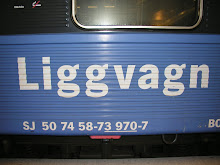I finished the novel The Man in the High Castle last night. It’s a chilling reminder of what life might have been like, had there been a different ending to the Second World War. Of course the problem with a book like that is that while the scenario suggested is plausible, so are an endless number of other outcomes. Sometimes history turns and pivots on such small moments of time and singular events, while at others there is more than meets the eye, and sometimes we never know exactly what lead to today.
Earlier, I was sitting on the bus on my way home from the unemployment office, which wasn’t so bad when you consider the horror stories that some people tell about the bureaucracy here. In any case, I was still thinking about the future and the various shapes that the future is capable of taking and I realized that most of them, when we sit and imagine them, come out as being dystopias. Especially in this day and age of cynicism: every future is a dystopia of some sort waiting to happen, every utopia we can imagine must have some dark side to it. Why is that? Is it possible that the future is always unpredictable, meaning beyond our control, and therefore to be feared? Or is it the unknown part of the future that leads to the fear of it? This kind of thinking is what I imagine is responsible for the conservative movements continuous worship of the past. The notion that it was better before and so we should return to that is ingrained together with a fear of the future. It also seems like it has some kind of control elements to it: when everything is defined and understood; then it is safe. Isn’t that why we often dislike new art or new music? Because we haven’t fully been able to make sense of or understand it yet?
Perhaps it’s simpler than all of the above reasoning. We know too much about our past, we have seen what humans are capable of toward one another and toward nature; therefore we assume we will not get any better than we already are (and the idea that we are somehow doing better than before is dependant on what measurements are being taken and by whom).
Here is the reading list as it currently stands:
1. Der Kleine Brüder by Sven Regener (finished)
2. The Witches of Eastwick by John Updike (finished)
3. The Handmaid´s Tale by Margaret Atwood (currently reading)
4. Freedom by Jonathan Franzen (considering buying this after all the reviews it got)
5. Eating Animals by Jonathan Safran Foer (non-fiction)
6. The Man in the High Castle by Philip K. Dick (orig. Flow my Tears, the Policeman Said)
7. The 158-Pound Marriage by John Irving
8. Going After Cacciato by Tim O´Brien
9. The Green House by Mario Vargas Lhosa
10. Grimms Wörter by Günter Grass
11. Wait Until Spring, Bandini by John Fante
12. Do Androids Dream of Electric Sheep by Philip K. Dick
13. Ubik by Philip K. Dick
14. The Stigmata of Palmer Eldritch by Philip K. Dick
_____________

No comments:
Post a Comment